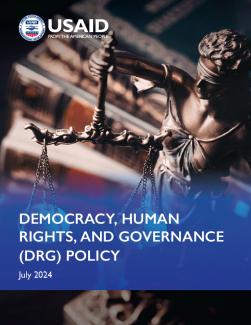This policy will optimize and align USAID’s investments, including those of the Democracy, Human Rights, and Governance (DRG) Bureau, to maximize the Agency’s contribution to democratic development. Expanding the community of resilient, rights-respecting democracies and reversing nearly two decades of democratic backsliding requires bold action and adaptation, including the deployment of a more expansive and nimble set of tools that can address both new and longstanding challenges. This policy prescribes changes—what we have called “pivots”—that USAID needs to make, in collaboration with our interagency and other partners, to contribute to a sustained, global renewal of democratic governance that better delivers justice, security, and inclusive development.
Advancing democracy, human rights, and governance is in the national security interest of the United States, and is essential for achieving global development objectives. It is also an expression of deeply held U.S. values founded on the belief that all people have an inherent right to be free from repression, tyranny, and the indignity of corruption, and to shape their own destinies. While the United States has long championed DRG, these concepts—which are enshrined in international conventions and law and furthered by global compacts such as the 2030 Sustainable Development Goals—have universal resonance. Surveys have consistently shown overwhelming support for democracy and human rights in countries around the world.1 This policy recognizes that while democracy is imperfect and progress is rarely linear, including in the United States, no system of government is better than representative democracy for unleashing human potential, respecting human dignity, and addressing the problems people face in their daily lives.
This policy builds on decades of USAID investment in the core pillars of democracy and governance, and partnerships with a diverse array of actors and institutions at all levels. It rests on a foundation of evidence and learning generated through cutting-edge DRG programming and USAID’s global cadre of experts and presence in more than 100 countries. This policy is rooted in the strategic approaches that preceded it, such as the 2013 DRG Strategy, which established human rights as central to USAID’s mission, and it works in alignment with all other USAID policies. It also follows the creation in 2023 of the DRG Bureau to lead the Agency’s efforts to invigorate democracy, support human rights and justice, and bolster governance. As USAID and its partners anticipate and face unprecedented threats to democracy, human rights, and accountable governance, this policy provides essential guidance for forging new partnerships, refining our tools, and modernizing our approaches.

